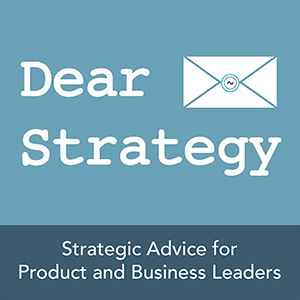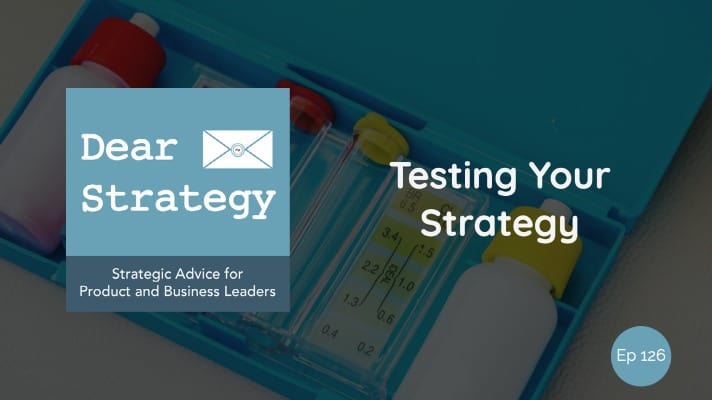On this episode of Dear Strategy, we answer the following question…
Dear Strategy:
“Is there a way to test your strategy prior to implementation?”
My answer to this question may actually be a bit controversial, so I’m just going to go ahead and get it out of the way up front. And here it is…
If you feel the need to test your strategy before you implement it, then you may be thinking about your strategy in the wrong way.
Now, I know some of you are saying, “But wait a minute! What about Voice of Customer? And what about user testing? And what about testing your strategy out on a small part of the market before unleashing on the rest of the world?” Yes, all of those are valid things to do. And all of them are highly recommended as an integral part of your strategic process. Those methodologies are going to provide key inputs to your strategy; they will form part of your strategic analysis and they are going to help you validate that the actions you’re planning to take are going to be the most effective ones to allow you to reach your goals. However, none of these methodologies are going to give you any guarantees that your strategy is actually going to work. And that’s the myth that I want to help you dispel.
At its core, a strategy is a plan to achieve a goal. But I’m going to add a key qualifier to that statement, which is that a strategy is a plan to achieve a goal under a set of anticipated conditions. And because you can never be 100% sure of what those conditions are actually going to be, your strategy will always have some level of uncertainty built into its own equation. In other words, your strategy is always going to contain some level of risk.
“A strategy is a plan to achieve a goal under a set of anticipated conditions.“
Let me give you a quick example of what I mean:
This past October, my wife and I decided to take the family on our annual weekend trip to Salem, Massachusetts. Being the site of the famed witch trials of 1692, the town of Salem always puts on a great show for Halloween and, for the past 6 years or so, our family has never missed an opportunity to head up there during the month of October to partake in the festivities.
Every year before we visit, we always make a plan. And that plan typically includes things like what we’re going to do, where and when we’re going to eat, and where we’re going to stay. Pretty standard stuff. But here’s where things get interesting…
The plan I just referenced is nothing more than a list of activities and actions. However, the only way a plan like that would have any chance of being successfully executed is if there was some sort of a strategy behind it – which means that my actions would need to have been developed based on some set of predicted conditions. So I would need to think about things like the weather, and the traffic, and the crowds, and the moods of my children… and the list goes on and on. Any one of those conditions could serve to alter my plan drastically. And any one of those conditions might have multiple different outcomes – none of which would be completely known or certain. So the best I can do is to analyze the situation as much as possible, look to past conditions to try to predict what is most likely to happen in the future, and then plan as best I can based on what I think is most likely to occur.
In short, a strategy isn’t just a plan; it’s a forecast. And you have to be prepared for the very real possibility that at least some part of that forecast is going to be wrong.
By the way, this year’s trip to Salem was actually a roaring success; not in spite of all the COVID-19 restrictions that existed at the time, but because of them! Because our plan had a solid strategy behind it, we were able to anticipate the restrictions, predict what the crowds were likely to do, and book everything out meticulously in advance at times and locations that would allow us to both see and do everything that we wanted to. Throughout the weekend, we ran into other families who had assumed that either nobody else would show up, or that the restrictions really weren’t going to be as bad as everyone thought. They all had plans too. But their plans were wrong, because the strategies behind them were flawed.
By the way, none of this should imply that my wife and I are some sort of strategic geniuses. Yes, we understand the process. But that doesn’t mean that we get it right 100% of the time. In fact, it’s quite the opposite. And that’s really the entire point that I’m trying to make. Your strategy is never going to be a sure thing. We got it right this year, but only because we had gotten it wrong many times before. And that’s exactly the mindset you need to adopt with respect to the strategic process. You gather as much information as possible, you put the best plan in place that you can based on all of the information you’ve gathered, and then you forge ahead. As you implement your strategy, you learn – both from your successes, your mistakes, and your observations of others who are trying to accomplish the same thing as you. Then you plug all of those inputs back into your strategy, and you improve it incrementally over time. That’s how the process works. And it’s the only real test that I can recommend.
So, if I were to shorten my answer down to a sentence, it would be this:
Q: “Is there a way to test your strategy prior to implementation?”
A: Yes. You can test your strategy by implementing it.
And as long as it is, in fact, a strategy, that’s the best advice that I know to give.
Listen to the podcast episode
Dear Strategy: Episode 126

Are you interested in strategy workshops for your product managers or business leaders? If so, please be sure to visit Strategy Generation Company by clicking the link below:
 Bob Caporale is the founder of Strategy Generation Company, the author of Creative Strategy Generation and the host of the Dear Strategy podcast. You can learn more about his work by visiting bobcaporale.com.
Bob Caporale is the founder of Strategy Generation Company, the author of Creative Strategy Generation and the host of the Dear Strategy podcast. You can learn more about his work by visiting bobcaporale.com.








